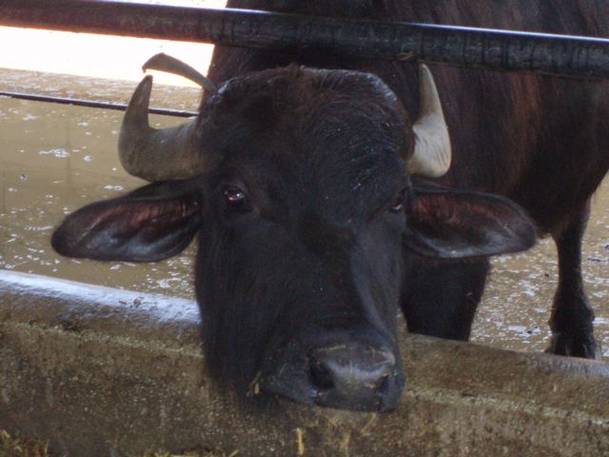In Rome last September, Michele wanted to go to restaurant Obika. This small restaurant in the Centro Storico specializes in mozzarella di bufala from different parts of Campania. We ordered a sampling from Salerno and Paestum. Two of the mozzarellas were fresh, and one was smoked. We also tried a ricotta and a burrata. The mozzarella from Salerno was creamy with a touch of sweetness while the one from Paestum was less creamy and more full flavored. The smoked mozzarella from Salerno had a nice smokey flavor and was creamy inside. Bufala milk is very rich in fat and protein, so it makes excellent mozzarella. The cheeses were so good; we decided to go to Campania to try them at the source.
We took the train south and knew we were getting close to our destination when we saw the water bufala from the window. We decided to go to Tenuta Vannulo, located near Paestum, because Michele had heard that they make gelato from bufala milk and she was dying to try it. I wanted to see the bufala up close.
At Vannulo, the bufala wander around in large pens and open areas and were either eating, resting or scratching their backs on a rotating brush device that looked like it was from a car wash. Our guide took us to the dairy area where they were making the mozzarella and they let us taste it just after it was shaped. While the mozzarella in Rome was excellent, it was obvious that getting it so freshly made was even better.
Mozzarella di bufala is porcelain-white in color, spherical in shape with a very thin glossy rind. It has a springy texture and a pleasantly tangy flavor taste with a faint mossy smell. When you buy it in a store, each ball comes vacuum-packed in its own brine-filled pouch. It should taste sweet and milky and not have a sour taste that you get when it starts to age.
Vannulo has a store where you can buy leather products made from the bufala hide and a café where you can enjoy products made with bufala milk. We had gelato (I had stracciatella, vanilla chocolate chip on a brioche--it was fantastic. Michele had chocolate and loved it), yogurt, ricotta, and butter and of course the mozzarella.
No one is quite sure how or when the bufala came to the region but the history of Mozzarella is linked to that of the water bufala. One account claims that it was in the year 596 AD when they were brought across the Mediterranean by the Longobards. Or maybe the Arabs brought them to Sicily. Mozzarella has been made in the Naples area since the 12nd century. It has the right climate for the bufala. Others say the animals
were not brought to Campania but are native to the region. It is true that most of the bufala in Italy were destroyed by the Nazis as they retreated toward the end of WWII. The Italians replenished the herds with animals from India.
Our favorite wine to drink with mozzarella di bufala is Falenghina from Feudi di San Gregorio, a white wine made from the Falenghina grape. This grape was brought to Southern Italy by the Greeks and is mentioned by Pliny the Elder in his Natural History (d.79AD). It is very popular in Rome at this time. The wine has good acidity with a touch of grass and herbs and undertones of citrus. It combines with the Mozzarella perfectly. I also like Lacryma Christi del Vesuvio Bianco made from the Coda di Volpe (tail of the fox) grape.
For a red, we like Gragnano. A light red wine, it is frizzante and can be served slightly chilled. It is made from three ancient grapes: sciascinoso, piedirosso (red feet) and aglianico. It has a good red fruit flavors and aromas that compliment the cheese. Neapolitans love this wine with Pizza Margarita. The mozzarella should be enjoyed on its own but goes great with tomatoes.
To distinguish it from cows’ milk mozzarella, which the Italians call fior di latte, you should always ask for Mozzarella di Bufala. It is made in other parts of Italy, and all over the world, but in my opinion the best mozzarella di bufala comes from Campania.
Obika restaurant has opened a branch in New York City on Madison Avenue.





